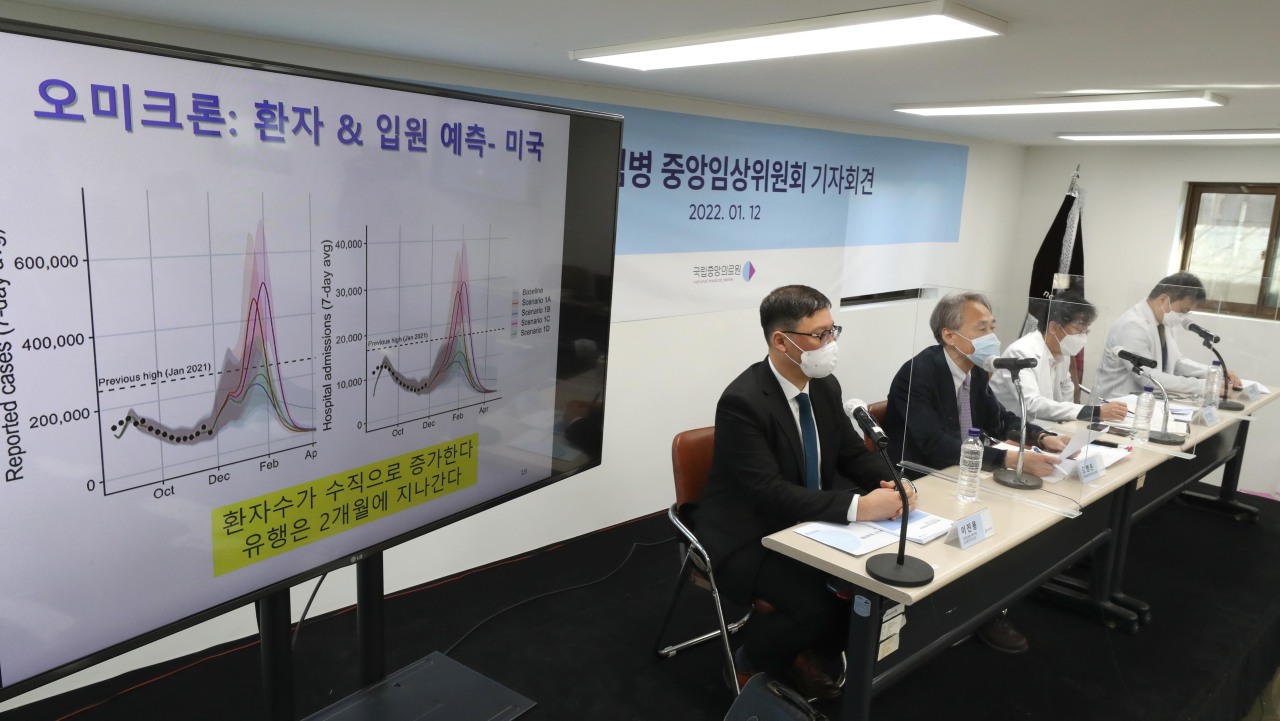‘Omicron is COVID-22’: Korea’s top national hospital doctor spells hope
Things are about to get really bad before they get better
By Kim ArinPublished : Jan. 12, 2022 - 15:19

Omicron may spell the beginning of the end of the pandemic, a leading infectious disease doctor at South Korea’s top national hospital said Wednesday.
Dr. Oh Myoung-don, who heads the National Medical Center‘s committee for clinical management of emerging infectious diseases, told a news conference Wednesday, “Omicron is a distinctly different virus from the coronavirus as we know it. COVID-22, if you will.”
While COVID-19 is known to infect the lungs, growing evidence suggests omicron primarily targets the upper airways, he said. “From the way it infiltrates human cells to results from animal studies to clinical data from many parts of the world, omicron looks like it’s much less severe than delta.”
He said that he believes omicron could be the “final obstacle” facing Korea in the pandemic. “The World Health Organization is speaking of hopes of an end, and I happen to echo that view,” he said.
Dr. Mike Ryan, the executive director of the WHO’s health emergencies program, said on Dec. 31, “The acute phase of the pandemic -- the pandemic that has been associated with the tragedy of deaths and hospitalizations -- that can end in 2022.”
The hospital’s director Chung Ki-hyun, speaking at the same press event, said, “Today I want to talk about the end of COVID-19.”
“Fall last year we learned that with COVID-19, there is no herd immunity in the true sense of the world. Even if we were to get the outbreak under control within the borders, the threat of a new variant emerging is something no individual country has powers to control,” he said.
He said omicron, to become dominant worldwide, “allows the possibility of a different way out than previously imagined.”
By COVID-19’s end, he stressed he did not mean the virus would disappear. “I mean that the kind of crisis mode we’ve been in for the last two years is going to be over,” he said.
Oh said that so far, the country’s medical systems “have been on alert against the possibility that COVID-19 is going to be severe for everyone that becomes infected.”
“Then came along omicron. As things change, so too will our response,” he said.
But the first few months of omicron’s dominance will be really bad, he warned.
Because of how fast it spreads, omicron is “almost certain to cause an explosive surge” that threatens to break hospitals -- a nightmare that is still fresh in Korea’s memory, he said. After lifting most restrictions in a bid to “return to normal” early November, Korea suffered its worst hospital crisis that left record numbers of patients to die at home waiting for a bed.
“About a month’s time is left until omicron becomes dominant in Korea. Depending on how prepared we are for that initial tsunami our transition to the post-omicron wave normal may not need to be so bad,” he said.
“While there is still time the government needs to ready the hospitals and the front lines for the absolute worst, where life-saving resources have to be rationed and patients are turned away.”
On the attempts to compare omicron with the common cold, he said they were “binary analogies” that he would rather avoid. “For some people COVID may hit more like the cold, for others it strikes as lethal pneumonia,” he said.
“Omicron can still send some people to intensive care rooms. So getting vaccinated and then boosted remain as important as ever.”
Although omicron appears to somewhat weaken the existing vaccines, a booster dose replenishes that reduced protection significantly, he said.
The only antibody drug used in Korea, Celltrion’s regkirona, “no longer works” against omicron, he added.
The national hospital doctors are not the first public health authorities here to associate omicron with the chance to emerge from pandemic-related restrictions.
Kwon Jun-wook, the director of the Korea National Institute of Health, said in a Dec. 31 interview with a public radio station that given omicron’s less severity, over 2022 “there may come a time when people get out of masks.”
According to the latest update from the Korea Disease Control and Prevention Agency, the number of omicron patients jumped to over 2,300 from around 1,300 a week prior. Two of the known omicron patients fell severely sick, while one died.
Meanwhile Korea’s portfolio of vaccines and treatments is about to get thicker.
On top of 80 million doses of two mRNA vaccines -- from Pfizer and Moderna -- and 10 million doses of homegrown vaccine the country has purchased or pre-purchased for this year, 40 million doses of Novavax’s vaccine are set to become available, to be administered primarily to the country’s unvaccinated adults.
The Ministry of Food and Drug Safety announced on this day it has granted an approval to Novavax’s vaccine on the condition that the company provides the final report on its clinical trials. The first shipment of Pfizer antiviral pills for some 20,000 people is also expected to arrive Thursday, to be prescribed to high-risk adults 65 and up.
By Kim Arin (arin@heraldcorp.com)







![[KH Explains] How should Korea adjust its trade defenses against Chinese EVs?](http://res.heraldm.com/phpwas/restmb_idxmake.php?idx=644&simg=/content/image/2024/04/15/20240415050562_0.jpg&u=20240415144419)











![[Today’s K-pop] Stray Kids to return soon: report](http://res.heraldm.com/phpwas/restmb_idxmake.php?idx=642&simg=/content/image/2024/04/16/20240416050713_0.jpg&u=)